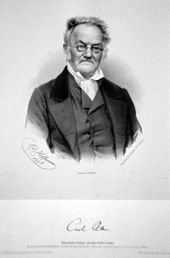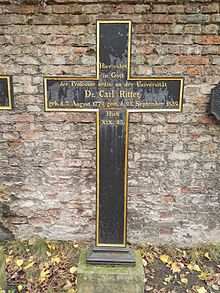Carl Ritter
Carl Ritter , also Karl , (born August 7, 1779 in Quedlinburg , † September 28, 1859 in Berlin ) is considered to be the founder of scientific geography alongside Alexander von Humboldt .
Life
origin
Carl Ritter was born in 1779 in Haus Steinbrücke 15 in Quedlinburg, which no longer exists . From 1785 he was a student of Johann Christoph Friedrich GutsMuths in Schnepfenthal at the Salzmann School in Schnepfenthal . In 1795 he met the Frankfurt merchant Johann Jakob Bethmann-Hollweg , who made it possible for him to study at the University of Halle and in 1798 brought him to Frankfurt am Main as a private tutor for his children.
Education
Ritter sometimes attended the Frankfurt grammar school with his students to complete his knowledge of Latin and Greek . At the same time, he also taught geography, history and natural history there. From 1810 to 1812 he lived with his pupils in Geneva . From 1813 to 1818 he worked in Göttingen on his main scientific work Geography in relation to nature and human history, or general comparative geography as a secure basis for studying and teaching physical and historical sciences . In 1819 he became a professor at the Frankfurt grammar school for a short time as the successor to Friedrich Christoph Schlosser .
academic career
In 1820 he was appointed to the chair for "geography, country, ethnology and national studies" at Berlin University . His lectures were very popular and were attended by contrasting personalities such as Otto von Bismarck , the later Prussian Minister of War Albrecht von Roon , who himself wrote several works on geography in the sense of Ritter, and Karl Marx . In Berlin in 1824, Ritter met the Swiss geographer Gerold Meyer von Knonau , with whom he had a long-term pen friendship. Ritter's research focus was not in the field of physical geography , but rather in the Romantic sense of the relationships between the natural environment on the one hand and man and his culture, although he did not indulge in mystical speculations, as is often the case in contemporary natural philosophy Find. Ritter's approach created the long-term basis for a cultural ecology . In addition, Ritter was very much concerned with historical geography. He was one of the founders of the Society for Geography in Berlin. He formed a group of reformers, which also included Theodor Freiherr von Liechtenstern and Alexander von Humboldt (1769–1859), who carried the development of geography into a modern science into schools since the turn of the century.
Research activity
Carl Ritter was very interested in the non-European world, especially in Africa , to which he dedicated the first volume of his multi-volume work on geography (1817, extended edition 1822). The preoccupation with Africa made him a radical opponent of slavery and the slave trade, which connected him with Alexander von Humboldt. Ritter paid special attention to the colony of Liberia , from which he expected a civilizing impulse for the entire continent. In this respect, Ritter was caught up in traditional, Christian-Occidental thought categories, but, unlike many contemporaries, he was not convinced of the innate superiority of whites. Ritter relativizes and partially rejects the Calvinist doctrine of predestination , which was popular in his time . Through his empirical studies, he sees in people who think and act internationally the possibility of changing a regional situation. The natural resources of the individual regions that humans have to deal with are, in his view, God's “dowry”. This is why the small continent of Europe has become “the (cultural) ruler over the whole world”. For various reasons, Carl Ritter sponsored Africa research .
One of his best-known students until 1844 was Heinrich Barth , who later became Africa explorer , who, through the mediation of Carl Ritter and the Prussian embassy to London, signed a contract with the London Foreign Office in 1849 as a participant in the Sahara-Sudan expedition. After Barth's return from Africa in 1855, the Carl-Ritter-Stiftung was established at his instigation. Barth's attempt to continue the cultural-historical research paradigm set by Ritter as an associate professor of geography at the University of Berlin failed because geography turned away from historical questions and turned to a natural science orientation, i. H. to physical geography, as it was successfully propagated from around 1870 by Georg Gerland and Oscar Ferdinand Peschel and u. a. at the University of Strasbourg .
Another student of Carl Ritter, who became important in the history of research trips, was the later China researcher Ferdinand von Richthofen .
One of his most famous students and enthusiastic supporters was the Swiss-American Arnold Henri Guyot . Guyot attended lectures by Ritter and Humboldt and was professor of physical geography at the College of New Jersey (now Princeton University ) in 1854 until his retirement in 1880 .
Honors
Ritter was the founder and actual member of the Wetterau Society for All Natural History, established in Hanau in 1808, in 1820 he was elected a corresponding member of the Göttingen Academy of Sciences . In 1822 he became a full member of the Prussian Academy of Sciences and in 1842 he was awarded the Order pour le mérite for science and the arts. In 1835 he became an honorary member of the Russian Academy of Sciences in Saint Petersburg . The Bavarian Academy of Sciences accepted him as a foreign member in 1848, in the same year the Austrian Academy of Sciences made him an honorary member. In 1849 he was elected to the American Academy of Arts and Sciences . In 1853 he received the Bavarian Maximilian Order for Science and Art .
The Carl-Ritter-Medal was awarded by the Society for Geography until the 1980s .
In Quedlinburg, a memorial was erected to Carl Ritter at the entrance to the Brühl in 1865 . His birthplace at Steinbrücke 15 was demolished around 1955. Another monument in the Mummental represents Johann Christoph Friedrich GutsMuths and Carl Ritter as teachers and pupils. The Carl Ritter educational center has had his name since 1990.
The Knight Mountains in China were named in his honor by his student Ferdinand von Richthofen . The moon crater Ritter and Mount Ritter in California also bear his name .
In the Bismarck Archipelago, Knight's Island , which later became famous through a devastating volcanic eruption, was named after him.
His grave is located in the St. Marien and St. Nikolai Cemetery I in the Berlin district of Prenzlauer Berg .
Works (selection)
- Montblanc. Geographical-historical-topographical description of KW Kummer's Stereorama or relief of the Montblanc Mountains and their immediate surroundings. Mahler Verlag, Stühlingen 2008. (New edition of the 1824 edition. For the first time with images of the stereo image of the Montblanc stick by KW Kummer, ISBN 978-3-941212-00-8 )
- Geographical-historical-topographical description of KW Kummer's Stereorama or relief of the Montblanc Mountains and their immediate surroundings. Karl Wilhelm Kummer, Berlin 1824, digitized
- Introduction to general comparative geography, and treatises in support of a more scientific treatment of geography . Reimer, Berlin 1852, urn : nbn: de: s2w-9579 .
- General geography. Lectures held at the University of Berlin . Reimer, Berlin 1862, urn : nbn: de: s2w-11826 .
literature
- Gustav Kramer : Carl Ritter. A picture of life based on his handwritten estate. 2 vols. Buchhandlung des Waisenhauses, Halle 1864. Extensive biography written by his nephew.
- Oscar Peschel : History of geography up to Alexander v. Humboldt and Carl Ritter. Cotta, Munich 1865.
- Friedrich Ratzel : Knight: Karl . In: Allgemeine Deutsche Biographie (ADB). Volume 28, Duncker & Humblot, Leipzig 1889, pp. 679-697.
- Heinrich Schmidthenner: Carl Ritter 1779-1859. In: The great Germans. Volume 3. Berlin 1956, pp. 189-200.
- Lothar Zögner: Carl Ritter in his time (1779–1859). Exhibition by the State Library of Prussian Cultural Heritage, Berlin November 1, 1979 - January 12, 1980. Exhibition and catalog. Berlin 1979.
- Karl Lenz (ed.): Carl Ritter - validity and interpretation. Contributions to the symposium on the 200th birthday of Carl Ritter, 1979. D. Reimer, Berlin 1981 (in it Peter Kremer: Carl Ritter's attitude to Africans - foundations for philanthropically oriented Africa research. )
- Hanno Beck : Carl Ritter. Genius of geography. To his life and work. Dietrich Reimer, Berlin 1979, ISBN 3-496-00102-X .
- Hanno Beck: Carl Ritter - Genius of Geography (1779-1859). In: Hanno Beck: Great Geographers. Pioneers - outsiders - scholars. Dietrich Reimer Verlag, Berlin 1982, ISBN 3-496-00507-6 , pp. 103-120.
- Peter Bernhardt, Jürgen Breuste: Literature about Carl Ritter (= Geographisches Jahrbuch. Volume 66). Hermann Haak, Gotha 1983, DNB 831013214 .
- Max Linke: Knight's Life and Work. Halle 2000, ISBN 3-932863-28-3 .
- Uta Lindgren : Knight, Carl Georg. In: New German Biography (NDB). Volume 21, Duncker & Humblot, Berlin 2003, ISBN 3-428-11202-4 , pp. 655 f. ( Digitized version ).
- Ulrich Päßler among colleagues. v. Eberhard Knobloch (Ed.): Alexander von Humboldt - Carl Ritter. Correspondence (= contributions to Alexander von Humboldt research. Volume 32). Berlin 2010, ISBN 978-3-05-004676-1 .
- Peter Goßens: Carl Ritter and world literature. On the early history of the ›spatial turn‹. In: Michael Eggers (ed.): Of similarities and differences. Comparison, analogy and classification in science and literature (18th / 19th century). Winter, Heidelberg 2011, pp. 91-120.
- Hans-Dietrich Schultz: “Heldengeschichten” or: Who (re) established geography, Alexander von Humboldt or Carl Ritter? In: Bernhard Nitz, Hans-Dietrich Schultz, Marlies Schulz (eds.): 1810 - 2010: 200 years of geography in Berlin (= Berlin Geographical Works , Volume 115). Berlin 2010, pp. 1-45 [2. verb. u. exp. 2011, pp. 1-49].
- Felix Schmutterer: Carl Ritter and his "Geography of Asia". The beginnings of scientific geography in the early 19th century. Dietrich Reimer, Berlin 2018.
- Hubert Olbrich: Arrangements on the outside of the globe - The geographer Carl Ritter (1779-1859) . In: Berlin monthly magazine ( Luisenstädtischer Bildungsverein ) . Issue 1, 2001, ISSN 0944-5560 , p. 73-77 ( luise-berlin.de ).
Web links
- Literature by and about Carl Ritter in the catalog of the German National Library
- Works by and about Carl Ritter in the German Digital Library
- Carl Ritter in the Internet Archive
Individual evidence
- ↑ Hans-Hartmut Schauer, Quedlinburg - half-timbered town, world cultural heritage , Verlag Bauwesen Berlin 1999, ISBN 3-345-00676-6 , page 20
- ↑ Hans-Dietrich Schultz: "Heldengeschichten" or: Who (re) established geography, Alexander von Humboldt or Carl Ritter? In: Bernhard Nitz, Hans-Dietrich Schultz, Marlies Schulz (eds.): 1810–2010: 200 years of geography in Berlin (= Berlin Geographical Works , 115). Berlin 2010, pp. 1–45, here p. 18
- ↑ See e.g. B. Andreas Schach: Natural philosophy and geography: epistemological considerations, reform of geography and possible current implications. Lit, Münster 1996 ( preview on Google Books ).
- ^ Rudolf Vierhaus (ed.): German Biographical Encyclopedia . 2nd, revised and expanded edition. Volume 8. Saur, Munich 2007, p. 442 ( digitized version ).
- ↑ Annals of the Wetterau Society for all natural history. Friedrich Wilmans, Frankfurt am Main 1809, Volume 1, p. Ii ( online ).
- ↑ Holger Krahnke: The members of the Academy of Sciences in Göttingen 1751-2001 (= Treatises of the Academy of Sciences in Göttingen, Philological-Historical Class. Volume 3, Volume 246 = Treatises of the Academy of Sciences in Göttingen, Mathematical-Physical Class. Series 3, volume 50). Vandenhoeck & Ruprecht, Göttingen 2001, ISBN 3-525-82516-1 , p. 202.
- ↑ Hans Körner: The Bavarian Maximilian Order for Science and Art and its members. In: Journal for Bavarian State History , Volume 47, 1984, pp. 299–398 ( online ).
- ^ Volcanic Events of the German Era: 1884-1914 . press.anu.edu.au (PDF)
- ↑ Grave of Carl Ritter. knerger.de
| personal data | |
|---|---|
| SURNAME | Ritter, Carl |
| BRIEF DESCRIPTION | German university professor, founder of scientific geography |
| DATE OF BIRTH | August 7, 1779 |
| PLACE OF BIRTH | Quedlinburg |
| DATE OF DEATH | September 28, 1859 |
| Place of death | Berlin |


